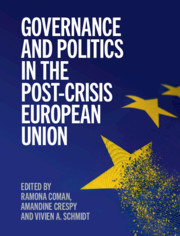
Governance and Politics in the Post-Crisis European Union
- Publisher's listprice GBP 34.00
-
16 243 Ft (15 470 Ft + 5% VAT)
The price is estimated because at the time of ordering we do not know what conversion rates will apply to HUF / product currency when the book arrives. In case HUF is weaker, the price increases slightly, in case HUF is stronger, the price goes lower slightly.
- Discount 10% (cc. 1 624 Ft off)
- Discounted price 14 619 Ft (13 923 Ft + 5% VAT)
Subcribe now and take benefit of a favourable price.
Subscribe
16 243 Ft

Availability
Estimated delivery time: Expected time of arrival: end of January 2026.
Not in stock at Prospero.
Why don't you give exact delivery time?
Delivery time is estimated on our previous experiences. We give estimations only, because we order from outside Hungary, and the delivery time mainly depends on how quickly the publisher supplies the book. Faster or slower deliveries both happen, but we do our best to supply as quickly as possible.
Product details:
- Publisher Cambridge University Press
- Date of Publication 27 August 2020
- ISBN 9781108711777
- Binding Paperback
- No. of pages444 pages
- Size 245x189x20 mm
- Weight 970 g
- Language English
- Illustrations 13 b/w illus. 1 map 12 tables 190
Categories
Short description:
An original new textbook providing an up-to-date, critical perspective of how the EU works, and what issues it faces, in the post-crisis era.
MoreLong description:
The European Union of today cannot be studied as it once was. This original new textbook provides a much-needed update on how the EU's policies and institutions have changed in light of the multiple crises and transformations since 2010. An international team of leading scholars offer systematic accounts on the EU's institutional regime, policies, and its community of people and states. Each chapter is structured to explain the relevant historical developments and institutional framework, presenting the key actors, the current controversies and discussing a paradigmatic case study. Each chapter also provides ideas for group discussions&&&160;and&&&160;individual research topics. Moving away from the typical, neutral account of the functioning of the EU, this textbook will stimulate readers' critical thinking towards the EU as it is today. It will serve as a core text for undergraduate and graduate students of politics and European studies taking courses on the politics of the EU, and those taking courses in comparative politics and international organizations including the EU.
'In this textbook, leading EU scholars provide a comprehensive account of how EU institutions and policies have changed during and after the multiple crises the EU has been facing since 2008.' Prof. Dr Tanja A. B&&&246;rzel, Chair for European Integration at the Otto-Suhr-Institute for Political Science, Freie Universit&&&228;t Berlin
Table of Contents:
Foreword; Chronology; Glossary; Abbreviations; 1. The European Union as a political regime, a set of policies and a community after the crisis: an overview Ramona Coman, Amandine Crespy and Vivien Schmidt; Part I. The EU's political regime: 2. European regional integration from the 20th to the 21st century Kiran Klaus Patel; 3. Institutions and decision-making in the European Union Sergio Fabbrini; 4. Regulatory networks and policy communities Jacob Hasselbalch and Eleni Tsingou; 5. Old and new concepts of EU governance: intergovernmentalism, supranationalism, and parliamentarism Vivien A. Schmidt; Part II. Key policy areas in flux: 6. Cohesion and the EU budget: is conditionality undermining solidarity? John Bachtler and Carlos Mendez; 7. Agriculture and environment: greening or greenwashing? Gerry Alons; 8. The internal market: increasingly differentiated? Michelle Egan; 9. The European Monetary Union: how did the Euro area get a lender of last resort? Cornel Ban; 10. Social policy: is the EU doing enough to tackle inequalities? Amandine Crespy; 11: Labour markets and mobility: how to reconcile competitiveness and social justice L&&&225;szl&&&243; Andor; 12: Managing the refugee crisis: a divided and restrictive Europe? Sarah Wolff; 13: Security in the Schengen Area: limiting rights and freedoms? Julien Jeandesboz; 14: Trade policy: which gains for which losses? Ferdi De Ville; 15. Global tax governance: is the EU promoting tax justice? Rasmus Corlin Christensen and Len Seabrooke; 16. The common security and defence policy in transition: towards 'strategic autonomy'? Jolyon Howorth; Part III: Existential debates: 17. North and south, east and west: is it possible to bridge the gap? Kristin Makszin, Gerg&&&337; Medve-B&&&225;lint and Dorothee Bohle; 18. Democracy and the rule of law: how can the EU uphold its common values? Ramona Coman; 19. Democracy and disintegration: does the state of democracy in the EU put the integrity of the Union at risk? Joseph Lacey and Kalypso Nicola&&&239;dis; Appendices; Index.
More



